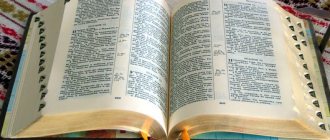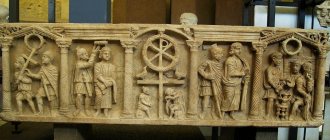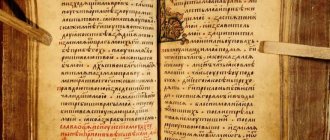Text of Psalm 49
The most popular versions of prayer are Church Slavonic and Russian, a modern translation. Christians hear the first text in churches during services; it is also not forbidden to use it for private appeals to the One Creator. The second is a worthy alternative with which unprepared righteous people can better understand the meaning of the ancient work.
With accents in Church Slavonic
In Russian
Text of prayer Psalm 49
In Church Slavonic with accents
Psalm to Asaph
1 The God of gods, the Lord of words, called the earth from the east of the sun to the west.
2 From Zion is the beauty of His beauty.
3 God will come, our God, and will not be silent; a fire will burn before Him, and a storm will surround Him.
4 Heaven will call from above and the earth to judge His people.
5 Gather together those who are like Him, who will make His covenant concerning sacrifices.
6 And the heavens will declare His righteousness, for God is the judge.
7 Hear, my people, and I will say to you Israel, and testify to you: God, I am your God.
8 I will not reprove you about your sacrifices, but your burnt offerings will be brought out before me.
9 I will not accept bulls from your house, nor goats from your flocks.
10 For all the beasts of the oak forest, the cattle of the mountains, and the oxen are mine.
11 I know all the birds of the sky, and the beauty of the countryside is with Me.
12 If I hunger, I will not say to you: For the world and its fulfillment are Mine.
13 Do I eat yam meat or drink the blood of goats?
14 Devour a sacrifice of praise to God and render your prayers to the Most High.
15 And call upon Me in the day of your tribulation, and destroy you, and glorify Me.
16 But God said to the sinner: How will you tell my justifications and accept my covenant with your mouth?
17 But you hated this punishment and you turned back my words.
18 If the thief saw you, you went with him, and you considered your participation with the adulterer.
19 Your mouth multiplies malice, and your tongue weaves together flattery.
20 When you sat down, you slandered your brother, and you set a temptation against your mother’s son.
21 Thou hast done these things, and kept silent, thou hast mourned iniquity, that I should be like thee. I will reprove you and bring your sins before you.
22 Understand this, you who forget God, lest he snatch away, and never deliver.
23 The sacrifice of praise will glorify Me, and there is the way, whereby I will show him My salvation.
In Russian
Psalm of Asaph
1The God of Gods, the Lord has spoken and called the earth, from the rising of the sun to the west.
2 From Zion, which is the height of beauty, God appears,
3 Our God comes, and not in silence: before Him is a consuming fire, and around Him is a mighty storm.
4 He calls on heaven and earth from above to judge His people:
5 “Gather to Me My saints, who have entered into covenant with Me by sacrifice.”
6 And the heavens will proclaim His righteousness, for this judge is God.
7 “Hear, My people, I will speak; Israel! I will testify against you: I am God, your God.
8 It is not because of your sacrifices that I will reproach you; Your burnt offerings are always before Me;
9 I will not accept a bull out of your house, nor a goat out of your folds,
10 For all the beasts of the forest are Mine, and the cattle on a thousand mountains,
11 I know all the birds on the mountains and the animals in the fields before Me.
12 If I were hungry, I would not tell you, for the universe and all that fills it are Mine.
13 Do I eat the flesh of oxen and drink the blood of goats?
14 Sacrifice praise to God and pay your vows to the Most High,
15 And call upon Me in the day of trouble; I will deliver you, and you will glorify Me.”
16 But God says to the sinner, “Because you preach My statutes and take My covenant in your mouth,
17 Do you yourself hate My instruction and throw My words away for yourself?
18 When you see a thief, you associate with him, and associate with adulterers;
19 You open your mouth to slander, and your tongue weaves deceit;
20 You sit and speak against your brother, you slander your mother’s son;
21 You did this, and I was silent; you thought that I was the same as you. I will expose you and bring [your sins] before your eyes.
22 Understand this, you who forget God, lest I take away, and there will be no deliverer.
23 Whoever sacrifices praise honors Me, and whoever watches his way, to him I will show the salvation of God.”
The Story of Psalm 49
The 49th Psalm should be considered as a collection of moralizing verses written by Asaph during the reign of the prophet David. In this work, the author raises such important topics: people’s worship of the Lord, fulfillment of the commandments. At the request of the king, the service was held in a solemn, dazzling atmosphere. Thus, the ruler emphasized that performing rituals was extremely important.
Asaph does not agree with this; his goal is to dispel the false view. David himself scattered them on his own; this happened during the transfer of the Ark of the Covenant to Mount Zion, then the prophet demanded moral purity from the people. The content of Psalm 49 can be compared to the content of the songs written by the king. This led experts to believe that Asaph was a contemporary of the famous psalmist.
History of writing and meaning of the psalm
The message to the Creator, filled with moralizing verses, was written by Asaph, one of the Levites, a priest during the reign of King David. Asaph presented his psalm with two themes: the worship of God by people and the fulfillment of the 10 Commandments of the Lord.
Prophet Asaph belonged to the priestly class and was the head of the musical choir
The Levite at the temple especially highlighted two sins:
- Formal, without the application of the heart, worship of God.
- Hypocritical attitude towards neighbors, not based on the 10 commandments.
Psalm 49 was written for Christians who have come to know the power of the Lord’s love, consider themselves children of the Church, but continue to sin recklessly. Often service and worship of the Almighty Creator turns into hypocritical ritual service under the guise of piety.
Important! In praising and glorifying the Creator, Christians must not forget about mercy to one another, in love, so that with the words of the psalmist, if necessary, they can instruct or warn each other from sin.
Purpose of Psalm 49:
- censure of those people who, while outwardly fulfilling religious duty, lead a worldly life, removing from it prayer appeals and praise to God;
- the prophetic exaltation of the glorification of the future Messiah;
- a representation of the time of Judgment, at which the Creator will demand from everyone an account of how you glorified the Lord, brought Him a sacrifice of praise, and why you replaced sincere love with hypocrisy.
When reading Psalm 49, every believer must “try it on” to his Orthodox life, so that one day he will be ready to answer for all his actions and thoughts.
When is Psalm 49 read?
The warning prayer was relevant for the ancient Jews, and it is so now, in the eyes of Orthodox Christians. Often visiting church and taking part in the sacraments, a person does not necessarily have the main thing in his soul - true, sincere faith. The author of Psalm 49 encourages people to focus on inner achievement. In other words, he asks the righteous to think about their lives, to take responsibility for their thoughts, words, and actions.
The song is read privately in the following cases:
- when it is necessary to guide unbelievers on the path;
- to bring reason to loved ones without the risk of conflict.
You can say the prayer in Russian and Church Slavonic; this has no fundamental significance.
Interpretation
Many experts insist that Psalm 49 be called an edification, but not a prayer or a song of praise. Thus, his text glorifies the name of the Lord, but the emphasis is on the need for the righteous to warn one another. The author addresses the lines to those who treat religion as a ritual service.
He condemns sacrifice, which is accompanied by sincere repentance. Those who call themselves children of the Church, but in life do not hesitate to be hypocrites and not adhere to God’s commandments, are also subject to reproof. This path for Christians, according to the psalmist, is disastrous.
Asaph describes the Last Judgment, during which God the Lord strictly examines the actions of the chosen people. He will accuse the Jews of serving Him “formally”, because along with making sacrifices from humble hearts, they treated their neighbors hypocritically.
The meaning of the work is revealed to those who take the time to carefully analyze the interpretation of the verses of Psalm 49:
- Verse 1 and 2: The Most High, who rules the world, is magnified.
- Verses 3 to 6: describes the fate of Christians who call themselves righteous, but are not. The author emphasizes that they will receive a fair trial.
- Verse 7 to 13: considerations on the topic of God's attitude towards the Jews. He condemns them for the formal nature of their service and their perfect rituals of sacrifice. According to the author, the Lord does not need the latter, because all living things, including livestock and animals in the forest, already belong to Him. This ritual was originally established for people who trust in Him.
- Verse 14 and 15: The Most High needs mankind's sincere faith in Him. The main sacrifice of people should be the sacrifice of reverence, that is, Christians need to live according to the commandments and praise God.
- Verse 16 to 23: the Jews sinned with immorality and hypocrisy, which is what the author accuses them of. The Lord knows about the true thoughts of His servants, so there is no point in hoping that a person’s sins will remain invisible to the eye of the Most High. Salvation will be granted to those who do not stop at praising the Lord, who strive for a pious life.
We read the Psalter. Psalm 49
Audio |
Conversation with Archpriest Alexy Ladygin about the Psalter.
– Dear brothers and sisters, we will analyze the 49th Psalm. Like the others, it has the inscription: “A Psalm to Asaph,” one of those who leads the psalmists. It echoes Psalm 48 - it also speaks about the last times and about man’s responsibility before the Lord, about the Judgment before which he will appear and be responsible for his past life. “The God of gods, the Lord, spoke and called the earth from the east of the sun to the west.” What gods? We must clearly understand that gods here are called righteous people who follow God, and those leaders who head the courts, rule the people and listen to the word of God, fulfilling His Law. “The God of gods is the Lord of the verb...”, that is, the Lord addresses all people living on earth. "...and called the earth from the east of the sun to the west." When it is said “from the east of the sun to the west,” this shows that the Lord embraces the whole earth and addresses everyone living on the earth.
“From Zion is the splendor of His beauty.” It speaks of spiritual beauty and of Zion as a place where the Lord takes special service, where the house of the Living God is built. Jerusalem, Zion are all synonyms for a place of grace, and in the Old Testament the most grace-filled place is where the Temple of Jerusalem was as the seat of the Living God. What kind of beauty are we talking about here? We always say that the Psalmist is not just sharing some impressions; he is a prophet, prophesies about future times - here he also prophesies about the Christian Church, which will be spread throughout the entire earth: it is also the place where the Living God dwells.
“God will come, our God, and will not be silent: a fire will kindle before Him, and a storm will surround Him.” “God will clearly come...” - here the psalmist David speaks about the Coming of Christ the Savior to earth: He “visibly” came, but at the same time His First Coming was secret, hidden both from man and from the enemy of the human race, who could not see Him to know. “Are you the Son of God?” he asks Him. “If you are the Son of God, then do such and such.” That is, the appearance of Christ was also hidden for him. But the Second Coming of Christ will be obvious: “God will come…”, that is, God will come clearly, “… and will not remain silent,” because He is our God. What will His appearance be like? Truly obvious to everyone - all nations and ends of the earth, the whole universe will see our God. The Lord will appear like lightning, from one end to the other, His Coming will be clear and visible. “...a fire will kindle before Him, and a storm will surround Him.” Just as it is impossible to pass by a storm without seeing it, so it will be impossible not to see the appearance of the Lord. His Second Coming will be like thunder, lightning, shaking of the air - all this attracts the attention of a person, like the shaking of the earth itself: there will not be a single person who will not see Christ coming to earth.
“Heaven will call from above and the earth to judge His people.” To expose people and bring judgment on them, the Lord will call Heaven from above and earth. The Holy Fathers differ slightly or complement each other in their interpretation of this passage of Holy Scripture. That is, the Lord will call both the righteous and sinners as a testimony to condemn people, Heaven and earth - nothing will be hidden from God, but everything will be obvious and will testify about a person’s life, about his good deeds or his untruths committed by him in the past. earth. Remember, the Holy Scripture says: “If a person remains silent, the stones will cry out about the works of God”? Even inanimate objects will speak about human deeds; they will testify to the good deeds performed by man. There are many different allegories about this in the Church, when even a brick placed in a church building for a person will testify to prayer for this person and for a good deed done in his name. That is why the Church has a tradition of personalized bricks placed in a church building or church fence: the name of the person is written on them - in the name of whom this brick or this stone is being placed. And these stones will testify. There is a legend that a certain good man did a good deed - he cleaned the church, washed the church floor and walls, which then testified to this good deed, done in the name of the Lord and the salvation of his own soul. That is, all the good that a person does and the evil that he does - all this is absorbed by the inanimate, material world, and it will also testify at the Last Judgment about our lives, about our deeds, and nothing will be hidden from the Lord . The Lord, in order to correctly convict a person and judge him, will call Heaven from above and earth. All the holy fathers say that if Heaven and Earth calls, then the angels of God will also testify about our life and all the deeds accomplished throughout our lives. Guardian angels, constantly staying with us, will testify to a person’s life.
“Gather to Him His venerables who have made His covenant concerning sacrifices. And the heavens will proclaim His righteousness, for God is the judge.” Whom does the Lord call venerable here? Righteous people who were like God in everything, lived and fulfilled the Law of God in everything, “who made His covenant about sacrifices,” that is, they fulfilled God’s covenant about sacrifices and acted as prescribed by the Law. If we note that this psalm speaks more about the life of the Jews, then naturally we must clearly understand what was holy for them, and the fulfillment of the Law was holy for them. He ordered sacrifices: if you do not offer sacrifices, then you should not talk about any righteousness. But if you do all this, then you become like God.
“And the heavens will declare His righteousness, for God is the judge.” Why will heaven tell the truth? Yes, because God is a judge, He has the right to judge man, everything is in the power of God, He is the Creator and Creator, and the whole universe obeys Him. He can change laws, He asks for the fulfillment of the Law. And if He is a judge, then we must tell God about our lives. Through all this we are dedicated to God. If we are dedicated to God, then we must live according to the vows we make.
“Hear, my people, and I will speak to you Israel, and testify to you: God, your God, I am.” Here God speaks to people. It is very important, and the Lord always pays attention to this, that everyone hears God: “Everyone who has ears, let him hear.” And it is not by chance that God addresses people: “Hear, my people...”, that is, do not just listen and let this phrase pass by your consciousness, but hear - we must accept every word when it is not someone, but God, who addresses us . “Hear, my people...”, and emphasizes that you are My people. He does not address those who have not known Him, He does not address the pagans, the infidels, those who bring filth into this life, but He does not address His people. In this case, if God is speaking through the prophet David to today, then He is speaking to each of us. And who are the people of God? Those who have received the sacrament of Baptism. We are the people of God, it is the Lord who speaks to us. He wants to tell us something important, and we must heed this word.
“...and I will say to you...” To whom shall I speak? Israel. The Lord very clearly emphasizes through the psalmist David that His people are Israel: “...and I will testify to you: God, your God, I am.” “It’s not just anyone reaching out to you. Why should you pay attention, strain your hearing, listen? You are My people, you are My Israel, and I am Your God, Creator, Maker. I am the one who does good to you throughout your life. I brought you out of captivity, saved you from the hands of the enemy, delivered you from slave labor. I do good for you on a private level, for everyone personally. I send you mercy and forgive your sins. I am your God. Therefore, I will speak now, and you pay attention to this as My creation, because the Creator Himself speaks to you.”
“I will not reprove you because of your sacrifices, but your burnt offerings will be taken away before Me.” What will the Lord talk about? Not about victims. Yes, God needs sacrifices, and you make them, you do everything according to the Law, correctly; these burnt offerings actually burn before Him, and He sees them. But that is not the importance. And what?
“I will not accept bulls from Your house, nor goats from Your flocks.” The Lord says that the pagans also make sacrifices - with a cold heart, without any attention, without working on themselves. He does not need such fulfillment of the external law, He will not accept just such a sacrifice: it must be offered, but not in this way. God commanded the Old Testament man to sacrifice not because God needed it, but so that man would not forget God, so that he would follow the outer path, but would apply greater zeal to it, that is, he would continue to improve. It's like prayer: if it is done outwardly, then it is not accepted by God. “They honor Me with their lips,” says the Lord in the New Testament, “but the heart is far from Me.” The external sacrifice must be accompanied by the internal work of everyone who believes in the true God and reveres Him - he must strive to fulfill His Law, but fulfill it in all truth, in purity, making every effort.
“For all the beasts of the oak trees, the cattle of the mountains, and the ox are mine. I know all the birds of the sky, and the beauty of the countryside is with Me.” “Everything is Mine,” says the Lord. – Do you think I feed on these sacrifices that you make? No, I am the Master, I am the Creator of this world, and everything that you bring to Me, I myself can take. Everything you sacrifice belongs to Me.” It must be said that the Old Testament man sacrificed sheep, goats, calves, and birds of the air to God. “...and the beauty of the countryside is with Me” - these are the fruits ripening in the field. And they sacrificed oil to God and burned it, so the Lord listed all this so that people would not think that He feeds on it; everything already belongs to Him.
And further He says: “Even if I hunger, I will not tell you: for the universe and its fulfillment are Mine. Do I eat the meat of yuncha or drink the blood of goats?” That is, the Lord says: “If I were hungry, then everything that is on this earth, I could take for myself at any moment - it belongs to me.” The Old Testament sacrifice is a prototype of the One Sacrifice, our Pascha, when the Lord already offers Himself as a Sacrifice. Therefore, the sacrifice is preserved, and until the end of the Old Testament the Lord does not abolish it. Seeing temptations and temptations, seeing the bias of the Old Testament man only in one direction, that he fulfills the external Law, but does not grow spiritually, the Lord still does not abolish it, but wants more from man. And through the prophet David he says: “Do not look for external sacrifice, do not think that I feed on this, I am the Lord of the universe and everything in this world belongs to Me.”
“Consume the sacrifice of praise to God and render your prayers to the Most High. And call upon Me in the day of your tribulation, and destroy you, and glorify Me.” What does it mean to “devour the sacrifice of praise to God”? God needs His glorification and service. God is glorified through our deeds and actions. “And give your prayers to the Most High”—an intense, earnest prayer is needed. The Holy Fathers say that prayer here means not only prayer as communication with God, but also those good deeds that a person should do. After all, prayer is the good that we bring to life. When do we glorify God? When we reveal Him to people. When we do good deeds, then we begin to communicate with God in fullness, truth, and truth. And the service itself must be true, deep - only in the fullness of serving God do we receive justification. And the fullness of service - through good deeds, through praise, praise, thanksgiving - should be to the true God. And who is God? What is the name of God? What God should we serve? And here the Psalmist prophesies about the Holy Trinity, saying: “Consume the sacrifice of praise to God and render your prayers to the Most High. And call upon Me in the day of your tribulation, and destroy you, and glorify Me.” That is: “Serve God the Father and render Thy prayers to the Most High (that is, God the Son). And call on Me (the Holy Spirit) in the day of your tribulation, and destroy you, and glorify Me.” This is how the deepest meaning of serving the Holy Trinity is revealed here. God will always help you and never leave you, and you can always glorify God when you truly honor Him.
“But God said to the sinner: How will you tell My justifications and accept My covenant with your lips?” The Lord says to the sinner: “Why do you honor Me only with your lips? You say one thing, but act differently, only outwardly you honor Me, but inwardly you do not serve Me at all? You say one thing and do another.” Here, of course, there is a denunciation of both the scribes and the Pharisees - they said one thing, but lived a completely different life. And the Lord condemns all this and warns us so that we never fall into the sin of unrighteousness. The Lord condemned even some small word of the Pharisee, who pointed at the tax collector. You should never point out a person who commits sin and untruth.
“But you hated punishment and you rejected My words.” What does “hated punishment” mean? That is, the mandate, what the Lord gave: the study and fulfillment of the Law of God. “It is one thing for you to make a sacrifice to Me, but another thing is for you to strive in every possible way to fulfill the Law that I gave you. This is the meaning of your ministry."
“If you saw your aunt, you flowed with him, and you considered your participation with the adulterer.” The Lord denounces not the one who himself commits theft and adultery, but the one who saw and did not stop this, remained silent, thereby committing this sin with him. Here the holy fathers also say about the New Testament times that we must strive in every possible way to fulfill the Law of God ourselves and to stop a person who commits a sin, that is, not to hide it before the confessor, the priest, so that the person is stopped before he makes a sacrifice of serving God.
“Your lips multiply malice, and your tongue weaves together flattery.” That is, your mouth has multiplied all unrighteousness, and your tongue also speaks all deceit.
“When you sat down, you slandered your brother and caused offense to your mother’s son.” Here the Psalmist very clearly says that each of us should not laugh at our brother’s sin and not disclose it - each of us is responsible for the word spoken, but disclosing the sin of another can cause him spiritual defeat, and not correction. Here everyone should care more about himself than about revealing his brother’s sin.
“Thou hast done this, and kept silent, thou hast abhorred iniquity, for I will be like thee. I will reprove you and bring your sins before you.” The Lord says very well in these words that he hated lawlessness and for the time being remains silent, seeing that a person sins, does not talk about sins, but waits for the person to bring correction. Not because He does not see, does not want to emphasize human sin, but waits for the person to correct himself, understand his sin and move away from this path.
“Understand this, you who forget God, lest he snatch away, and never deliver.” The Lord, even if a person sins, still cares about him, strives for him to come to repentance, to correct himself, so that the enemy does not kidnap him or destroy him, so that it is possible to bring repentance. God also cares about sinful people.
“The sacrifice of praise will glorify Me, and there is the way in which I will show My salvation.” It says more here that the Lord accepts every sacrifice from a person, but an internal, spiritual sacrifice, and this sacrifice must be associated with contrition and humility of his spirit. “The sacrifice of praise will glorify Me...” What sacrifice of praise is the Lord talking about? Of course, this speaks of the One Sacrifice that our Lord Jesus Christ offered for the whole world and for all humanity. “...and there is the way by which I will show him My salvation” - and in this Sacrifice lies the path of every person. Whoever accepts this Sacrifice, who unites with it, receives salvation and will be glorified for all ages.
An amazing and wonderful psalm. He gives us spiritual courage and speaks of our responsibility for our lives. So that we do not accept our service to God as external: for God it is not external service that is important. For Him, the most important thing is our inner life, our contrite and humble heart.
Recorded by Elena Kuzoro








